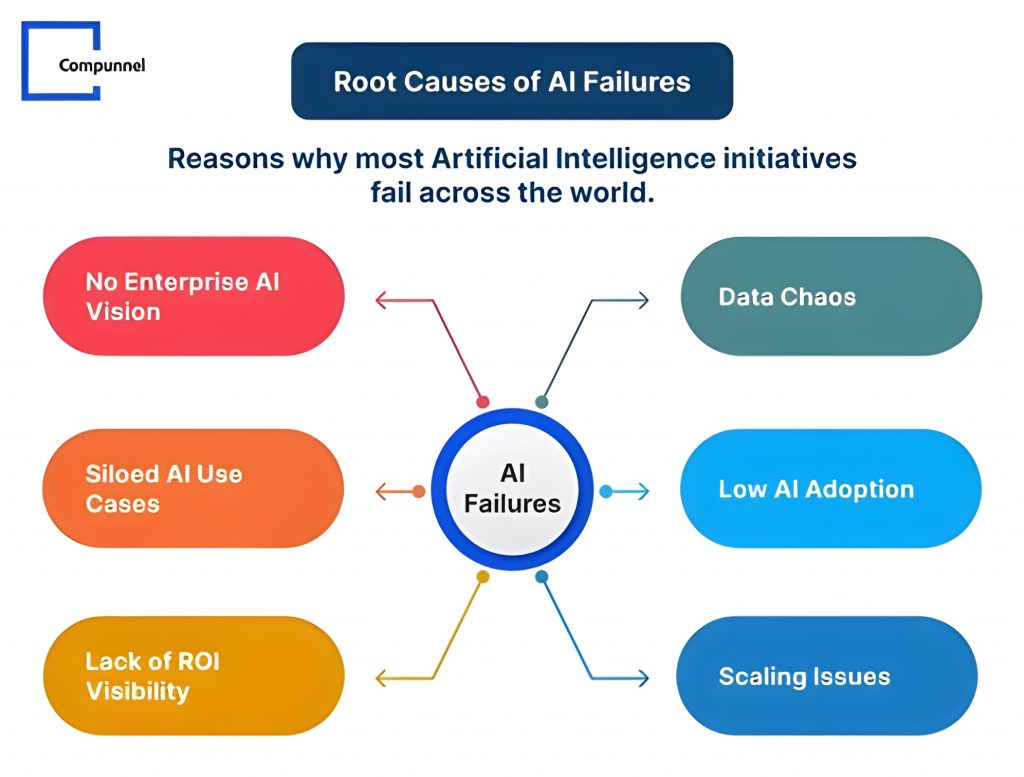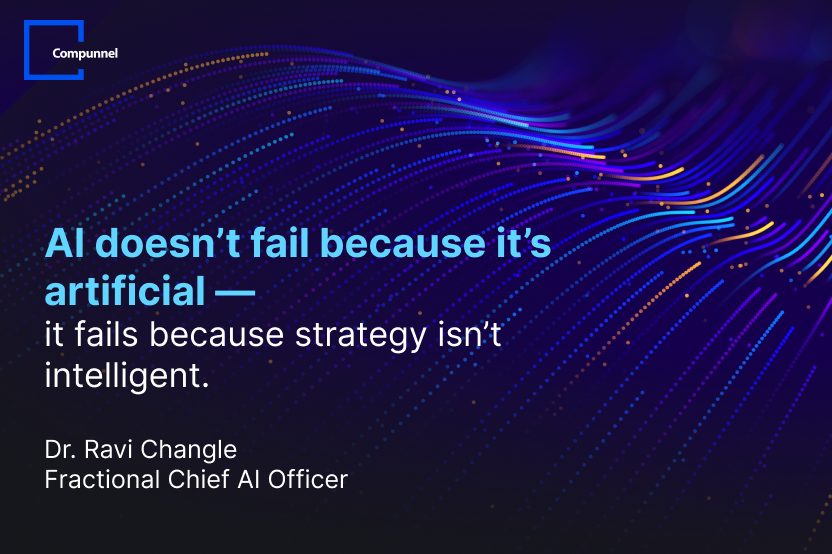Your Local Talent Pool Just Ran Out. Here Is What Smart Companies Are Doing Instead.
The Hiring Crisis Nobody Saw Coming (Except Everyone Did) Picture this: a mid-sized fintech company in New Jersey posts a…
Artificial Intelligence (AI) has progressed from being experimental technology to being a boardroom priority. Still, with huge investments, the rate of AI failure is stunningly high.
A study by Gartner reveals that as many as 85% of AI initiatives do not meet their promised goals. Further, in a 2024 report by IDC, it was established that only 25% of AI projects make it to production, while the remainder gets stuck in pilot state. This increasing frequency of AI failure statistics isn’t bad technology – it’s a broken strategy.
This creates a critical question for CEOs and CXOs to ponder: Is AI dying on its own within your company before it ever really gets a chance to succeed?
The world is facing the situation where AI projects tend to get stuck in pilot stages, resulting in escalating expenses, reduced ROI, and compromised competitive positioning.
Furthermore, conventional financial ROI measures are inadequate when measuring AI investments. Unlike traditional projects, the Return on AI investment (RoAI) needs to capture more strategic values like enhanced decision-making, customer experience, innovation capability, and competitive agility. Organizations tend to neglect to measure these intangible values, which results in perceived underperformance and early cancellation of promising AI initiatives.

Most artificial intelligence failures are not caused by technical issues or artificial intelligence mistakes, contrary to what people think. The actual problem is the way organizations tackle AI:
The usual situation:
This results in a vicious AI environment where the success rate of AI is horrifically low across sectors.

Treating AI as a stand-alone IT project is one of the largest contributors AI fails. Without an integrated AI strategy grounded in business goals, the prevalence of AI failure statistics only increases over time.
Accenture’s latest research indicates that firms with the greatest AI maturity realize up to 50% higher revenue growth and 30% better operational efficiency. But only a limited number make it to this top level.
This is precisely where Compunnel’s Chief AI Officer as a Service (CAIOaaS) shifts the landscape for business executives. CAIOaaS is programmed to address each cause of artificial intelligence failures in its tracks — by infusing executive-level AI leadership directly within your organization.
| Failure Factor | CAIOaaS Solution |
| No Enterprise AI Vision | Customized AI Roadmap aligned to business goals |
| Siloed AI Use Cases | Unified governance across departments |
| Lack of ROI Visibility | KPI-driven AI Performance & ROI Framework |
| Data Chaos | End-to-end Data Readiness & Strategy |
| Low AI Adoption | AI Literacy & Cultural Change Programs |
| Scaling Issues | Operational AI Integration at every touchpoint |
| Ethical & Regulatory Risks | Responsible AI Governance Framework |
As a C-level executive, you can no longer afford to think of AI as an experiment. The rate of AI fails in business is a cold, hard truth—but it doesn’t have to be yours.
With Compunnel’s CAIOaaS, AI is a business asset — not a business risk. It turns disparate, risky initiatives into a strategic, scalable advantage.
Answer: Most AI failures are caused by strategic misalignment, poor data quality, lack of executive sponsorship, siloed initiatives, and skill gaps, rather than technical shortcomings. Without proper governance, AI projects often remain stuck in pilot stages, reducing ROI and competitive advantage.
Answer: Common pitfalls include disconnected AI initiatives, broken data ecosystems, shortage of executive sponsorship, skill shortages, cultural resistance, and absence of business strategy alignment. These factors hinder AI adoption and scaling across organizations.
Answer: AI failures usually stem from organizational and strategic misalignment. Projects start in silos, lack leadership oversight, operate on fragmented data, and suffer from insufficient AI literacy, resulting in low adoption and stalled progress.
Answer: Success should be measured using Return on AI Investment (RoAI), capturing strategic values such as enhanced decision-making, improved customer experience, innovation capability, operational efficiency, and competitive agility, not just financial ROI.
Answer: Compunnel’s Chief AI Officer as a Service (CAIOaaS) addresses AI failures by providing executive-level AI leadership, strategic roadmaps, unified governance, data readiness, cultural change programs, operational integration, and responsible AI frameworks, ensuring AI initiatives succeed.
Answer: Organizations benefit from faster AI adoption, measurable outcomes, reduced errors, improved operational efficiency, enterprise-wide AI literacy, and a scalable competitive advantage, transforming AI from a risky experiment into a strategic business asset.
Answer: Yes, AI failure is optional when organizations adopt strategic AI leadership, proper governance, data readiness, and enterprise-wide alignment. Services like Compunnel’s CAIOaaS engineer success by converting risky AI initiatives into structured, measurable, and scalable advantages.
